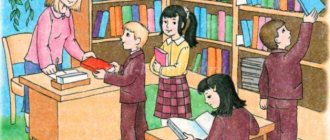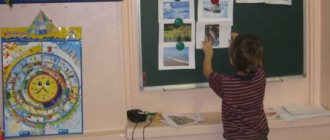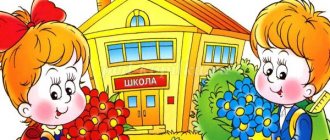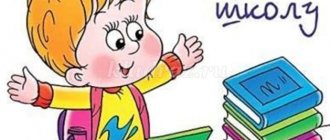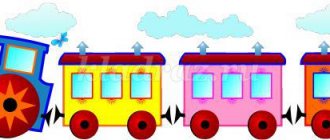Scenario of an entertainment activity “Native Language Day” for the middle group of kindergarten
Anna Petrovna Shurutina
Scenario for an entertainment activity “Native Language Day” for the middle group of kindergarten
Educator: Shurutina A.P.
Scenario of the activity-entertainment “Native Language Day” for the middle group of kindergarten
Goal: Creating conditions for acquaintance with International Mother Language Day
Tasks:
• Form an idea of your native language
• Develop children's curiosity and interest in other languages
• Foster respect and love for the native language and representatives of different nations
Materials: Poster with the Russian alphabet, books with Russian folk tales, proverbs, sayings, riddles, a ball, bells for each child, leaves with letters, colored pencils.
Progress of the lesson:
Vos. : Good morning, Guten tag, Upchedyzh sh*u! Hello guys! Who knows what date is today? (February 21).
- Mom, nana, apa, maze, muter...
Vos. : And our Motherland, our mother land is our Adygea. This is where we were born and live. This is our native land, here is our home, and the kindergarten, and the Belaya and Laba rivers, and the Caucasus mountains. Today is a special day, because today is a wonderful holiday - International Mother Language Day.
Every nation has its own language dear. What language do we speak? (in Russian). Our native language is Russian.
The Russian language is beautiful, rich and expressive. Each language has its own alphabet. The Russian language also has its own alphabet. Let's remember him.
A poster with the Russian alphabet is hung.
Vos. : With the help of the Russian alphabet we can read books. Look at what books are on the table here: Russian folk tales, nursery rhymes, riddles, proverbs and sayings (the books presented at the exhibition are listed).
Children are invited to name Russian folk tales, tell nursery rhymes, proverbs, sayings, and make riddles.
Vos. :Now let’s play: “Say it in one word”
Sofa, table, wardrobe furniture
Boots, shoes, footwear
Penguin, stork, crow - birds
Rose, lily, bell - flowers
Cow, dog, deer are animals
Vos. : what a great fellow you are! Guys!
Now let's play Russian. folk game "plum apple". A golden apple, a pouring apple, rolled along the hands and stopped; the one with the apple stopped goes into the circle.
Children stand in a circle and perform play actions.
Vos .: Each of you has a beautiful name, your parents gave you that name. Let each of you ring a bell and say your name.
Vos .: Before you are letters from the Russian alphabet, choose the letter with which your name begins, circle the letter and decorate it with beautiful patterns.
International Mother Language Day Recently, while leafing through the ethno-calendar, I came across the date of February 21, it turns out that the UNESCO General Conference in 1999 was intended to promote. Scenario March 8 for the middle group of kindergarten Scenario March 8 for the middle group of kindergarten. Progress of the entertainment Children easily and freely enter the hall and form a semicircle. (to the music “entrance”).
Scenario of autumn entertainment for children of the middle and senior groups of kindergarten “The Scarecrow is looking for friends” Goals: To develop dexterity and endurance. To consolidate children's knowledge about autumn phenomena. Cultivate goodwill and a desire to help each other.
Scenario for the holiday Defender of the Fatherland Day in the middle group of kindergarten Goal: To educate children in a patriotic attitude towards their Motherland. Tasks. Fostering pride in Russian soldiers, developing emotional skills. Scenario of the holiday “Golden Autumn” for the middle group of kindergarten Presenter: Dear children, our guests! Today we gathered for the Autumn Festival. Multi-colored paints worked for a long time, Nature came out beautiful. Scenario of entertainment “Day of Knowledge” in the area of the kindergarten Scenario of entertainment “Day of Knowledge” in the area of the kindergarten. Leading. What day is today? That's right, the first of September is Knowledge Day. Today.
Source
International Mother Language Day in kindergarten
Svetlana Aleshina
International Mother Language Day in kindergarten
International Mother Language Day in kindergarten.
International Mother Language Day, proclaimed by the General Conference of UNESCO on 17 November 1999, has been celebrated annually on 21 February since 2000 to promote linguistic and cultural diversity and multilingualism. Languages are the most powerful tool for preserving and developing our material and spiritual heritage.
For most people, it is natural to communicate and convey emotions in their native language. Only man has received such a unique gift - to have the gift of speech. People at the international level tried to emphasize the originality and uniqueness of each language, each dialect, by creating a holiday of the same name - International Mother Language Day.
Each nation has its own characteristics, traditions, and culture. All this distinguishes each nation from each other. Without language the world would not exist. Just as a fish cannot live without water, so a person cannot exist without language. On International Mother Language Day, all languages are recognized as equal because each is uniquely suited to human purpose and each represents a living heritage that we must take seriously and protect. Usually the first language a person learns to speak is their native language. They speak it, write letters, poems, and sing songs. We were taught to speak it by our relatives, we think in it. Speaking and writing correctly in your native language means being able to think and express your thoughts. Therefore, you need to know and protect your native language.
As part of the celebration of Mother Language Day in the middle group “Zvezdochka”, an unusual guest “Tongue” was waiting for parents . Our Russian language is rich and beautiful, there are so many words in it, with the help of which we can compose stories, invent fairy tales, write poetry and simply communicate.
Correct speech and competent speech are always bright, expressive and understandable.. The child must see a worthy speech example, an example to follow. Competent speech is not given at birth. You need to work on this constantly, throughout your life.
Pedagogical project "Year of the Russian language at preschool educational institutions"
Yalanskaya Natalia Alexandrovna
Teacher of the preschool educational institution "NURSERY - GARDEN No. 4"
YASINOVATAYA CITY"
PEDAGOGICAL PROJECT “YEAR OF THE RUSSIAN LANGUAGE IN MPreschool Educational Institution”
Article
The huge role of the Russian language in the modern world is determined by its cultural value, power and greatness, the great significance that the Russian people, the creator and speaker of this language, had and still has in the history of mankind.
According to the Decree of the Head of the Republic Denis Pushilin, 2021 in the Donetsk People's Republic has been declared the Year of the Russian Language.
Our institution also took part in events dedicated to this event, because the development of speech is closely connected with the formation of consciousness, intelligence, knowledge of the surrounding world, the development of the individual as a whole, his aesthetic and moral ideals.
In order to systematize the events and attract a larger number of participants to them, the creative group of the MDOU developed the pedagogical project “Year of the Russian Language in Kindergarten”
PROJECT OBJECTIVES:
— development of a system and search for effective methods and techniques to improve the pedagogical skills of educators in matters of speech development of preschool children;
- formation of speech culture, intelligence, patriotic and international feelings of pupils, introducing them to the treasury of Russian speech, Russian folklore, Russian literature;
— involvement of participants in the pedagogical process in public events held within the framework of the Year of the Russian Language in the Republic, city, preschool institution.
To realize the first goal of the project, a lot of work was done with teachers.
The pedagogical polylogue “The Origins of Russian Writing and Culture” was dedicated to the history of Russian writing. The teachers actively discussed the question: where does Russian writing come from and where did it come from? They learned the history of the celebration of the Day of Slavic Culture and Literature, were surprised by the fortitude of the brothers Cyril and Methodius in the struggle for the formation of the Slavic language, and spoke about the peculiarities of the speech style of outstanding children's writers.
The model of speech for our students is the teacher’s speech, therefore, as part of the project, training “Culture of Teacher Speech” was conducted. During the training, criteria for the correctness of the teacher’s speech were developed, and while performing creative tasks, teachers thought through and conducted interactive games “Word Carousel”, “Researchers - Etymologists”, “Synonym - Antonym”, “Rhymes”, “Such Necessary Words”.
Photo 1. Pedagogical polylogues “The Origins of Russian Literature and Culture”
In the preschool institution, innovative technologies for the speech development of preschoolers are constantly being studied and implemented. The work experiences of Natalya Aleksandrovna Yalanskaya “Plot-based role-playing and director’s games in the social and communicative development of children” (2018), Elena Anatolyevna Nekoz “An integrated approach to the development of speech of a young child by enhancing joint play activities with an adult” (2018) are summarized. In the year of the Russian language, the treasury of teachers’ experience was replenished with such methodological developments as the work experience of Inna Gennadievna Sopina “Use of innovative techniques in the cognitive and speech development of children”; a creative group of teachers from the Moscow Preschool Educational Institution developed a long-term plan for introducing children to the origins of Russian folk culture for preschool age groups.”
In order to intensify the implementation of innovative methods of speech development for preschool children, a seminar-workshop “Teaching to know, love, and cherish the great Russian language” was held. At which each teacher presented one of the innovative technologies for speech development and completed practical tasks on its use.
These innovative technologies and an activity-based approach to the development of children's speech are actively used by teachers in the process of basic educational activities.
Thus, mnemonic techniques are widely used in the work of senior and preparatory groups.
Photo 2. Using mnemonics in working on fairy tales by A.S. Pushkin.
There is a green oak near the Lukomorye,
Golden chain on oak volume.
Day and night the cat is a scientist
Everything goes around and around...
The theory of solving inventive problems - TRIZ is an indispensable technology for the intellectual, cognitive and speech development of children, in our opinion, it is the basis of the activity approach to the development of the personality of a preschooler.
MDOU has accumulated experience in using almost all elements of this technology in preschool groups. Older pupils use systematic and analytical tables, perform creative tasks in composing fairy tales and word creation.
Gaming technology is the most organic for preschool children. In early preschool age we use finger games, situational games, didactic games, role-playing games, and theatrical games. In preschool groups - directing, plot-role-playing, educational, games - travel. Thus, we form the communicative abilities of children, enrich the vocabulary and grammatical potential of pupils.
LEGO is a technology that we are just beginning to master, realizing that when building buildings, a child learns to analyze, compare, imagine, look for options, reason, verbally evaluate the initial situation and results, which greatly contributes to the development of monologue speech. Collective work on LEGO construction enriches the experience of using dialogic speech, its explanatory and evidentiary aspects.
A very important event of the project was the intensification of work in groups to create a subject-specific spatial developmental speech environment.
Photo 3. Children's book corner in the preparatory group. Thematic exhibition of works by K.I. Chukovsky.
Thus, in February 2021, on the occasion of the International Day of the Russian Language, corners “Learning our native language” were created in the senior and preparatory groups; in March and April 2021, on the dates dedicated to World Poetry Day,
On World Writer's Day, International Children's Book Day, educators, children, and parents created exhibitions “Favorite Books, Favorite Writers” in all groups.
During the exhibition design process, the “My Parents’ Favorite Children’s Book” campaign was held.
One of the project activities was a joint research activity with the families of the pupils on the topic “My nationality, my language”; the children concluded that children of different nationalities go to kindergarten.
Photo 4. National Unity Day “My nationality, my language.”
The result of the study was a holiday on National Unity Day in kindergarten, where children got acquainted with national costumes and games. The leitmotif of the holiday was the idea that the kindergarten will welcome very different children: Russian, Ukrainian, Belarusian, Tajik, but everyone’s favorite Russian is our native language!
a person who reads can master the riches of the Russian language.
. Not every family nowadays has a sufficient library of children's books. Therefore, as part of the project, an excursion to the city children's library was held.
Librarian Korikova L.A. spoke about the rules for using the library, children's books, and together looked at the exhibition of works by A.S. Pushkin, took part in the quiz “Guess the fairy-tale hero” based on the works of the great poet, and read his poems.
Celebrating the 220th anniversary of A.S. Pushkin and the International Day of the Russian Language under the UN program also became one of the stages of the project “Year of the Russian Language in Kindergarten”: Pushkin evenings were held in groups, at which children were introduced to the works of the great poet, an exhibition of crafts and family drawings “My Favorite Fairy Tale” was prepared "
But the most interesting event was the Quest - the game “In the magical land of fairy tales”
Photo 5. Arina Rodionovna is a guide to the magical land of Pushkin’s fairy tales.
Arina Rodionovna met the children in the courtyard of the kindergarten and invited them to the magical land of heroes from Pushkin and Russian folk tales.
At the magic oak tree they saw a miracle - a learned cat and Leshy, who played outdoor games with the preschool children.
The kids were very surprised to see the Mermaid sitting on the branches. The mermaid gave them a quiz and noted that the children knew fairy tales very well
A.S. Pushkin. And Koschey the Immortal settled on the sports ground with a chest of gold. But the guys were not afraid: they showed him their knowledge of Russian folk tales and even taught him how to play sports in old age.
And Ruslana and Lyudmila told a fairy tale about themselves, written by A.S. Pushkin, and offered to play the role of heroes.
At the end of the journey, Sleeping Beauty was awakened by a magic bell.
This event made it possible to consolidate and systematize a huge layer of children’s knowledge about the work of A.S. Pushkin, Russian folk tales, games.
Russian folklore is a treasury of the Russian language. Nursery rhymes, sayings, sentences, counting rhymes, funny jokes accompany the baby from the first days of life; The most favorite genre of folklore for preschoolers is Russian folk tales.
Photo 6. Folklore festival “Russian gatherings”.
The holiday “Russian Gatherings” was dedicated to the theme of Russian folklore. Pupils of the senior and preparatory groups acted out humorous folk dialogues, “revived” nursery rhymes and jokes, sang ditties, chants, danced folk dances, and played folk ritual games.
The week of theatrical activities, which included a day of Russian folk tales, aroused no less interest among the children and parents of the preschool educational institution.
The results of the Year of the Russian Language were summed up at an open meeting of the creative group for the Year of the Russian Language. The MDOU team watched the video presentation “Formation of speech culture, intelligence, patriotic feelings of participants in the educational process through the implementation of the pedagogical project “Year of the Russian Language in MDOU”.
Thus, participation in events dedicated to the Year of the Russian Language enriched the knowledge and competence of MDOU teachers in the field of speech development of children, familiarization with the culture, history, traditions, folklore of the Russian people, and gave students the opportunity to touch this with their souls, to feel like a part of the great Russian people - a part of the Russian world.
Entertainment scenario “Native Language Day” for children of senior and preparatory groups
Rozhkova
Entertainment scenario “Native Language Day” for children of senior and preparatory groups
Municipal preschool educational institution kindergarten No. 55 "Ryabinka"
ENTERTAINMENT SCRIPT
«MOTHER LANGUAGE DAY»
For children of senior and preparatory groups
TEACHER: ROZHKOVA L.V.
Entertainment script “ Mother Language Day ”
Goal: To introduce children to “ International Mother Language Day ”
.
Enrich the spiritual world of children ; through various activities, to form in children their attitude towards International Mother Language Day .
- give an idea of what a native language and why it is called native . develop children's curiosity and interest in languages .
— to cultivate respect and love for the native language , as well as for other languages .
On the topic: methodological developments, presentations and notes
I believe that it is necessary to introduce a regional studies component into teaching English, so throughout the entire academic year I conduct educational events dedicated to various topics.
“Russian Birch Festival” is timed to coincide with the celebration of the Holy Trinity Day. This holiday has ancient roots in Rus' and harmoniously combines the traditions of Christianity and paganism. The purpose of entertainment poses.
Today we often hear from television screens and from leading politicians the word “tolerance” that has recently become familiar to us. At the proposal of UNESCO, the first decade of the new century was declared a Decade.
To give an idea of International Mother Language Day and to enrich the spiritual world of children. Develop a love and interest in your native language, poetry; learn to respect the language and culture of other peoples; to work on.
International Mother Language Day is a fairly young holiday - it has been celebrated since February 2000 in order to attract attention to the native language. This is already relevant in preschool age, especially for children.
Source
